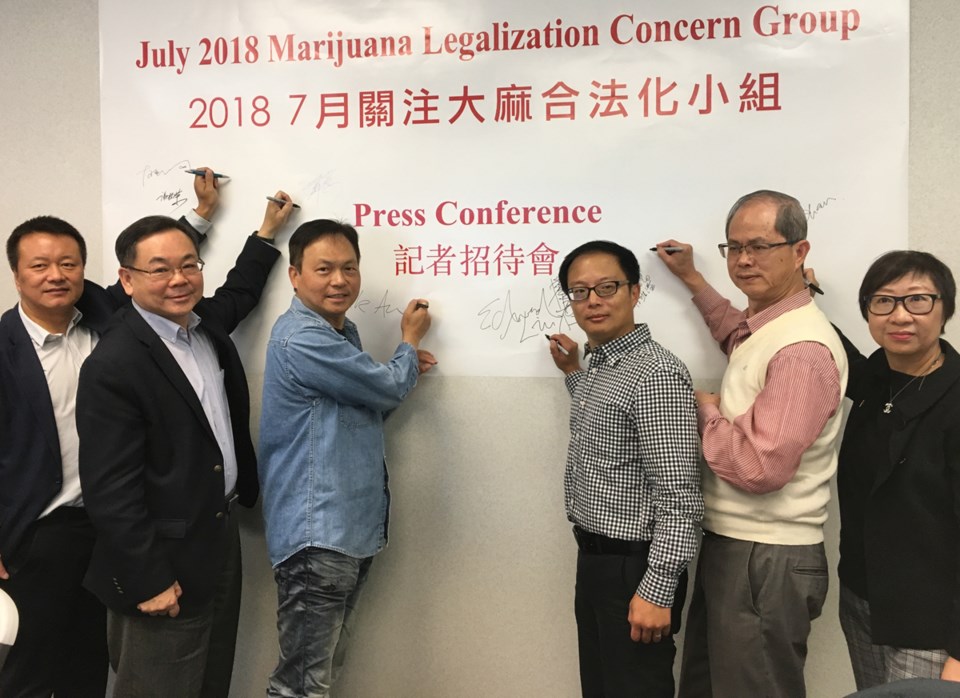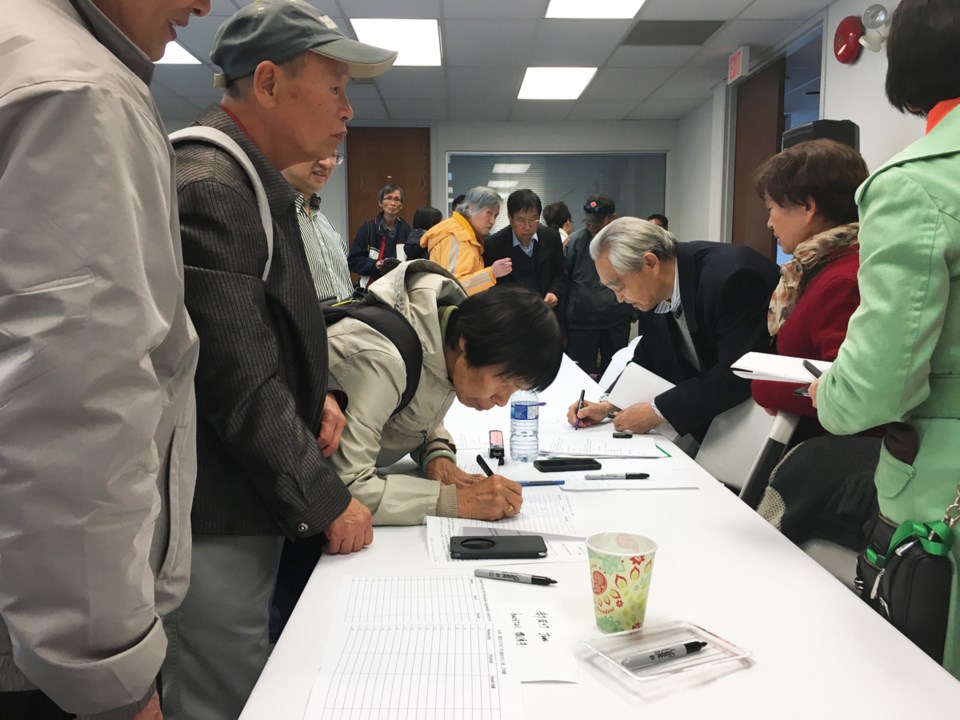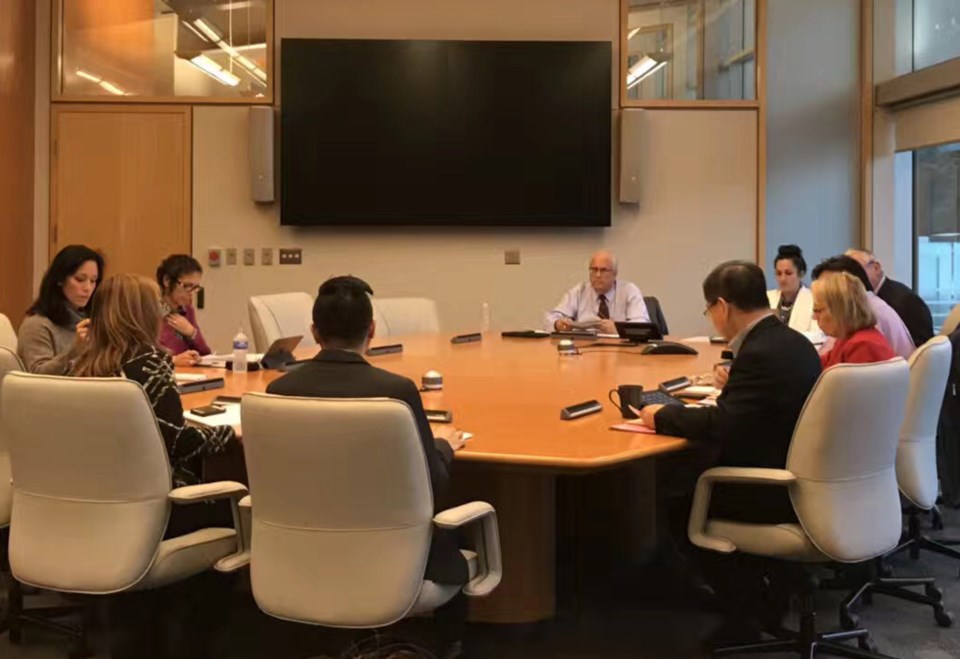Legalized recreational marijuana is coming to Richmond, but the city’s not ready, according to a new group led by Coun. Chak Au.
The “2018 Marijuana Legalization Concern Group” has asked the federal government to postpone or suspend the July, 2018 deadline for pot legalization until all regulations are in place.
“Once the gate of legalization is opened, it cannot be reverted back,” said Au at the group’s press conference held Oct. 13.
“We need to work together now to prevent the social problems that may be caused by legalization later.”

The group has listed more than 20 requirements for the three tiers of government to meet before legalization, and encourages Richmond residents to fill out the provincial marijuana online survey, which closes Nov. 1.
An online petition has also been launched to delay legalization, and has gathered 3,000 signatures to date.
“We hope for everyone to pay attention to this issue,” said Au.
“Marijuana legalization is not far away from you and I… You may not consume or grow it, but your neighbours may do so, and your kids’ classmates may access it and bring it to school.”
The group’s requirements include increasing the minimum age to 21, prohibiting personal cultivation at home and banning marijuana products in the form of food and drink.
“Medical evidence shows having marijuana at an early age will disturb the brain’s development,” explained Au.
“And growing cannabis at home or putting it into food and drinks may result in children consuming it by mistake.”
The group also wants the provincial government to ensure landlords have the legal right to forbid tenants from consuming or growing marijuana on their property, and asks that marijuana be sold at designated locations only.
“We ask the governments to meet all the requirements before cannabis is officially legalized,” said Au.
However, Sensible B.C., a marijuana legalization advocacy group, said the group is overreacting.
“We are more than ready, and have been ready for years,” said Dana Larsen, spokesman of Sensible B.C.
“People can make the decision whether to smoke (cigarettes) and drink (alcohol) at age 18 and 19, but don’t have the ability to decide if they want to smoke cannabis? That sounds absurd to me.”
He also argued that fresh cannabis plants will not endanger children’s health before they have been dried and consumed, “just like other regular plants.”
But he did agree that edible products with cannabis can pose a risk for children and that such products need to be well labeled.
“People are overly worried. Once legalization happens, they will realise everything is fine,” said Larsen.

City prepares for legalization
Although legalization of marijuana is federal jurisdiction, both provinces and municipalities have a certain amount of control over regulation and distribution.
For example, the province will decide on the retail model for cannabis sales, regulations for public consumption and drug-impaired driving.
The B.C. government can also choose to set a higher minimum age of consumption, set a stricter limit on personal possession, or lower the number of plants allowed to be grown at home — which is four under the federal government’s Bill C-45.
Last Monday, Richmond city council passed a staff report on the city’s input into cannabis legalization, which will be submitted to the provincial government, along with a letter and a response to the survey.

“I strongly criticise the federal government’s process of legalizing marijuana,” said Coun. Bill McNulty at the general purpose committee meeting.
“Where am I protected? When the house nextdoor hosts a pot party, what can I do?
“Do I have to sit there and smell the weed untill 11 p.m. and call the police to come to tell them to stop?”
McNulty and other councillors agreed to “strongly disagree” with cannabis legalization as the city’s response for the survey and asked for the rights to make stricter rules at the municipal level.
In the report, the city stated a preference for a government model of distribution “to eliminate the role of organized crime,” and asked the province to allow local governments to set rules for personal cultivation, as well as control the retailers’ locations through land-use regulations.
The city also asked the province to share the revenue related to marijuana sales and suggested stricter rules regarding the public consumption of cannabis than those that exist for tobacco or alcohol.
In addition, the city endorsed 19 as the minimum age and agreed with the federal government’s 30-gram limit on personal possession of dried cannabis and the prohibition of personal possession of cannabis by youth.
The goal is to “ensure Richmond continues to be a safe community,” said the report.
Survey to shape B.C. decisions
The provincial government said it is working hard to meet the July 2018 target.
“We are on a very tight time frame because of the federal government’s time line for the legalization in next July,” said Mike Farnworth, Minister of B.C. Public Safety and Solicitor General.
“We’ve asked for more time, other provinces have asked for more time, but the federal government is sticking to their target,” he told the Richmond News.
Farnworth said that the cabinet will start making decisions based on the information gathered by Nov. 1, and that a provincial marijuana act is slated to be ready in February or March.

“(The survey) certainly will help shape our decisions,” said Farnworth.
“It’s important to see how the local government wants retail in their communities, because what works in Vancouver may not work in Richmond.”
With different voices from parties across the province, Farnworth said their primary goal is “to keep cannabis out of the hands of children, and to get organized crime out of the cannabis industry.”
He noted that no legislation decisions regarding cannabis have been made by the B.C. government yet.
Joe Peschisolido, Steveston-Richmond East Member of Parliament, told the News Wednesday that the federal government will not move ahead with marijuana legalization if it’s not ready.
“(The concern group) is right; things are not ready yet, we are still in the process,” said Peschisolido.
He said the federal government is working with various provincial governments across the country to come up with a system.
“Our view is that there is a seven-billion-dollar Canada-wide illegal market for marijuana… we want to strictly regulate and control the sale of it,” said Peschisolido.
“And we want to send out the message that it’s wrong for children to have marijuana.”
He said the bill will come back to Parliament for further debate, and the House of Commons will be looking at the legislation at a meta-level next spring or summer.



